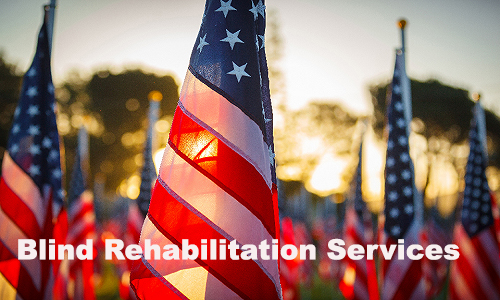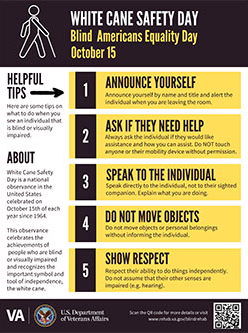Rehabilitation and Prosthetic Services
Blind and Visual Impairment Rehabilitation Services
Blind Rehabilitation Services (BRS)
 The Department of Veterans Affairs provides Blind and Visual Impairment Rehabilitation Services to eligible Veterans and active duty Service members. VA is the first and only national healthcare system to completely and seamlessly integrate rehabilitation services for patients with vision loss into its health benefits. This ensures that patients receive the finest medical and rehabilitative care, as well as cutting-edge assistive technology.
The Department of Veterans Affairs provides Blind and Visual Impairment Rehabilitation Services to eligible Veterans and active duty Service members. VA is the first and only national healthcare system to completely and seamlessly integrate rehabilitation services for patients with vision loss into its health benefits. This ensures that patients receive the finest medical and rehabilitative care, as well as cutting-edge assistive technology.
Mission
The mission of Blind Rehabilitation Service (BRS) is to assist eligible Veterans and active duty Service members with a visual impairment in developing the skills needed for personal independence and successful reintegration into the community and family environment.
Vision
Blind Rehabilitation Service will provide care coordination, assessments and therapeutic instruction to help Veterans and active duty Service members reclaim the confidence and skills needed to lead an independent, fulfilling life after vision loss.
BRS - Site Navigation
- About Blind Rehabilitation Service
- Blind Rehabilitation Centers
- Blind Rehabilitation Services Outpatient Clinics
- History of Blind Rehabilitation Service
- VIST Coordinators
- Web and Recreational Resources Veterans with Visual Impairment
Eligibility
BRS serves Veterans and active duty Service members with vision loss that cannot be corrected with regular eyeglasses and who are having difficulty with one or more tasks.
The eligibility of prospective patients to receive BRS care is determined by the review of 3 key criteria:
- Veteran is eligible for VA health benefits (or active duty Servicemember) AND
- Possesses a visual impairment or
- Has received a designation of excess disability (impact on functional abilities).
When to refer to a VIST Coordinators
- When a patient or family member reports concern with any of the following:
- Trouble with driving
- Bumping into things at an increased frequency
- Increase in falls that may be related to visual changes
- Trouble with reading
- Trouble with seeing items clearly
- Any time there is a reported concern for visual functioning
- Contact a VIST Coordinator.
Blind Rehabilitation Fact Sheets
- Blind Rehabilitation
- Blind Rehabilitation - Advanced Low Vision Clinic (ALVC)
- Blind Rehabilitation - Assisting Veterans With a Visual Impairment
- Blind Rehabilitation - Blind Rehabilitation Center (BRC)
- Blind Rehabilitation - Blind Rehabilitation Outpatient Specialist (BROS)
- Blind Rehabilitation - Dual Sensory
- Blind Rehabilitation - Human Guide Technique
- Blind Rehabilitation - Intermediate Low Vision Clinic (IVLC)
- Blind Rehabilitation - Visual Impairment Services Outpatient Rehabilitation (VISOR)
- Blind Rehabilitation - Visual Impairment Services Team (VIST)
 VA proudly recognizes White Cane Safety Day and Blind Americans Equality Day every October 15th. This day is dedicated to celebrating the achievements of individuals who are blind or visually impaired. View our White Cane Safety Day – Helpful Tips Sheet to learn how you can help support individuals who are blind or visually impaired.
VA proudly recognizes White Cane Safety Day and Blind Americans Equality Day every October 15th. This day is dedicated to celebrating the achievements of individuals who are blind or visually impaired. View our White Cane Safety Day – Helpful Tips Sheet to learn how you can help support individuals who are blind or visually impaired.



















